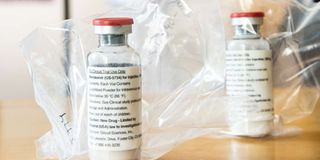Premium
New questions about remdesivir efficacy in Covid-19 treatment

This file photograph taken on April 8, 2020, shows vials of the drug 'remdesivir' during a press conference on Covid-19 medication at The University Hospital Eppendorf (UKE) in Hamburg, northern Germany.
What you need to know:
- The study is raising fresh questions about the efficacy of the broad-spectrum antiviral medication originally developed to treat Ebola and approved in May for emergency use on Covid-19 patients.
- A randomised, controlled trial of remdesivir in 584 patients, hospitalised with pneumonia at 105 hospitals in the United States, Europe, and Asia from March 15 to April 18, yielded disappointing results.
Remdesivir, the only US-authorised drug for Covid-19, may not significantly improve outcomes, a new study has found.
The study is raising fresh questions about the efficacy of the broad-spectrum antiviral medication originally developed to treat Ebola and approved in May for emergency use on Covid-19 patients.
It is one of the two drugs proven to work against Covid-19, the other being dexamethasone.
But new research published in the Journal of the American Medical Association (JAMA) found that there was no significant improvement in patients put on a 10-day course of remdesivir, over those who did not get the drug, as both died at the same rates.
And although patients on remdesivir did report fewer severe symptoms of Covid-19 overall, they also experienced more minor to moderate symptoms and side effects.
A randomised, controlled trial of remdesivir in 584 patients, hospitalised with pneumonia at 105 hospitals in the United States, Europe, and Asia from March 15 to April 18, yielded disappointing results.
All the patients in the study were at least 12 years old and had been hospitalised with moderate Covid-19 pneumonia. They were divided into three groups. One received a 10-day course of remdesivir and the second a five-day course, while the third was treated without the drug.
The study
Compared to standard care without remdesivir, patients put on the 10-day course died at the same rates as those who did not get the drug.
According to the study, although patients on remdesivir did report fewer severe symptoms of Covid-19 overall, they experienced more minor to moderate symptoms and side effects.
The researchers then compared the patients' outcomes in two ways by charting the number of adverse effects experienced and negative symptoms like nausea, and measured how much they improved.
The scientists also tracked the lengths of hospital stays, recovery times, and how long patients required respiratory support.
After 11 days, patients in the 10-day group did not seem to fare significantly better than patients treated without the drug over the same length of time.
In fact, those who received the antiviral drug saw more mild to moderate side effects and symptoms than those who did not take the drug.
The patients were also more likely to experience nausea, headaches, and hypokalemia: a condition caused by low potassium that can cause heart irregularities.
In a commentary accompanying the study, Erin McCreary and Derek Angus, two researchers at the University of Pittsburgh Medical Center, said the findings raise a question about "whether the drug is less efficacious than hoped”.
However, they also wrote: “There are important design differences across the trials. First, the National Institutes of Health–sponsored Adaptive Covid-19 Treatment Trial (ACTT-1) was larger and therefore was better powered to find smaller differences. Second, the study populations are not the same.”
Further, the scientists added, it is plausible that antiviral therapy is more efficacious if started sooner, and therefore targeting moderate rather than severe disease would be a reasonable approach.
Emergency use
Remdesivir was granted emergency use authorisation by the US Food and Drug Administration on May 1 for patients hospitalised with severe Covid-19.
At the time, there had been two randomised clinical trials (RCTs) that had compared a 10-day course of remdesivir with placebos.
Although it was not found to be very effective against Ebola, remdesivir works by inhibiting enzymes that play a role in the replication of viruses like coronaviruses.
In 2014, Gilead, the American company developing the drug began, investigated its use as a treatment for coronaviruses like SARS and MERS.
The company started clinical trials to determine whether the drug was effective against Covid-19.
In May, a study published in the New England Journal of Medicine found that Covid-19 patients treated with remdesivir had an average recovery time of 11 days, compared to 15 days for patients who had received a placebo.
Gilead donated its drug supply for two months after the emergency use authorisation was granted.
In June, the company announced it would charge governments of developed countries Sh252,800 ($2,340) for a five-day course.
Although the researchers say it is still possible for remdesivir to improve recovery for millions of patients hospitalised with Covid-19, they added, more research is needed before that becomes clear.
Several other gold-standard trials are underway but for now, important questions remain regarding remdesivir's efficacy, McCreary and Angus wrote in the commentary published alongside the study.
They raised questions about whether some patients get more benefits from remdesivir than others and whether it matters if patients receive remdesivir and steroids together.





